American small businesses, entrepreneurs and inventors, driven by the desire to contribute to the greater good of the country, are stepping up to produce personal protective equipment (PPE), such as face shields and gowns, for frontline health care workers battling the spread of the COVID-19 disease.
On several fronts, the U.S. textile industry has united to play a critical role in the production of PPE products for the nation.
One North Carolina textile company, Glen Raven Inc., has become a major player behind the scenes, working with its customer base who traditionally cut and sew products such as awnings, tents, furniture and cushions– to scale up production of highly needed face shields and gowns.
 The 140-year-old performance fabric manufacturer with six manufacturing facilities in North Carolina, South Carolina and Pennsylvania, along with 12 distribution facilities in 11 states, has stepped into the PPE game and is having a major impact.
The 140-year-old performance fabric manufacturer with six manufacturing facilities in North Carolina, South Carolina and Pennsylvania, along with 12 distribution facilities in 11 states, has stepped into the PPE game and is having a major impact.
Glen Raven has participated in discussions between hospital groups and health care organizations and its customers, while also organizing frequent calls to discuss bests practices, materials, suppliers, and the best ways to get the product to market.
Companies like Hoover Architectural Products in Florida, Chair Care Patio in Texas and Rainier Ltd. in Washington state are just a few of its customers that have tapped their talented workforce to innovate and create new designs for PPE products for their local hospitals, health care workers and communities.
“This effort has been a collective undertaking among all of Glen Raven’s business units. From day one, our entire company has been laser-focused on collaborating with organizations like the National Council of Textile Organizations (NCTO), the Industrial Fabrics Association International (IFAI), and healthcare systems across the country to help identify Personal Protection Equipment (PPE) needs. The ultimate goal was to identify, engage and leverage the capabilities of our industry in an effort to supplement demand for critical PPE products,” said Bret Kelley, vice president of sales, Trivantage. “Together we are more powerful, and through collaboration with healthcare agencies, hospitals, our customers, suppliers, and other groups we are able to make a greater impact. Through our collective efforts, we hope to help keep first responders, and front-line workers safe and assist our customers in putting people back to work. We are hopeful this process will result in sustainable longer-term benefits for the healthcare industry and our industry by developing a more robust domestic supply base for PPE.”
While there are many stories, five Glen Raven/Trivantage customers have shared their stories and experiences below.
They have innovated and created new designs—often equal to or better than the medical products currently on the market– by finding new ways to use fabrics and materials traditionally used for outdoor and industrial applications. Their collective voices underscore the importance of maintaining and cultivating a domestic apparel, textile and industrial supply chain and minimizing the country’s reliance on foreign imports during a global crisis.
Chair Care Patio
For the past 32 years, Debby Martz’s company, Chair Care Patio, has carved a niche in patio furniture repair and custom cushion and pillow designs in the Dallas/Fort Worth area.
“We started this business as a hobby in our garage in 1988,” Martz said. “We were repairing patio furniture with vinyl straps and over the years we took it from the garage to 30,000 square feet of space in Dallas. We started with one sewing machine making replacement slings for our local Dallas/Fort Worth customers and that grew and grew to patio shops buying wholesale from us and an online business of custom designed cushions, pillows and slings.”
But over the course of just one month, the COVID-19 pandemic has put her company– along with tens of thousands of other American small businesses– to the test
Instead of shuttering her business, Martz met the challenge head on.
First approached by a local hospital, Martz said she started making prototypes of face shields, and later protective gowns, to help frontline health care workers battling the spread of the disease.
She tapped into a diverse cushion fabric inventory and started experimenting with new fabrications for gowns while also using vinyl materials and foams for face shields.
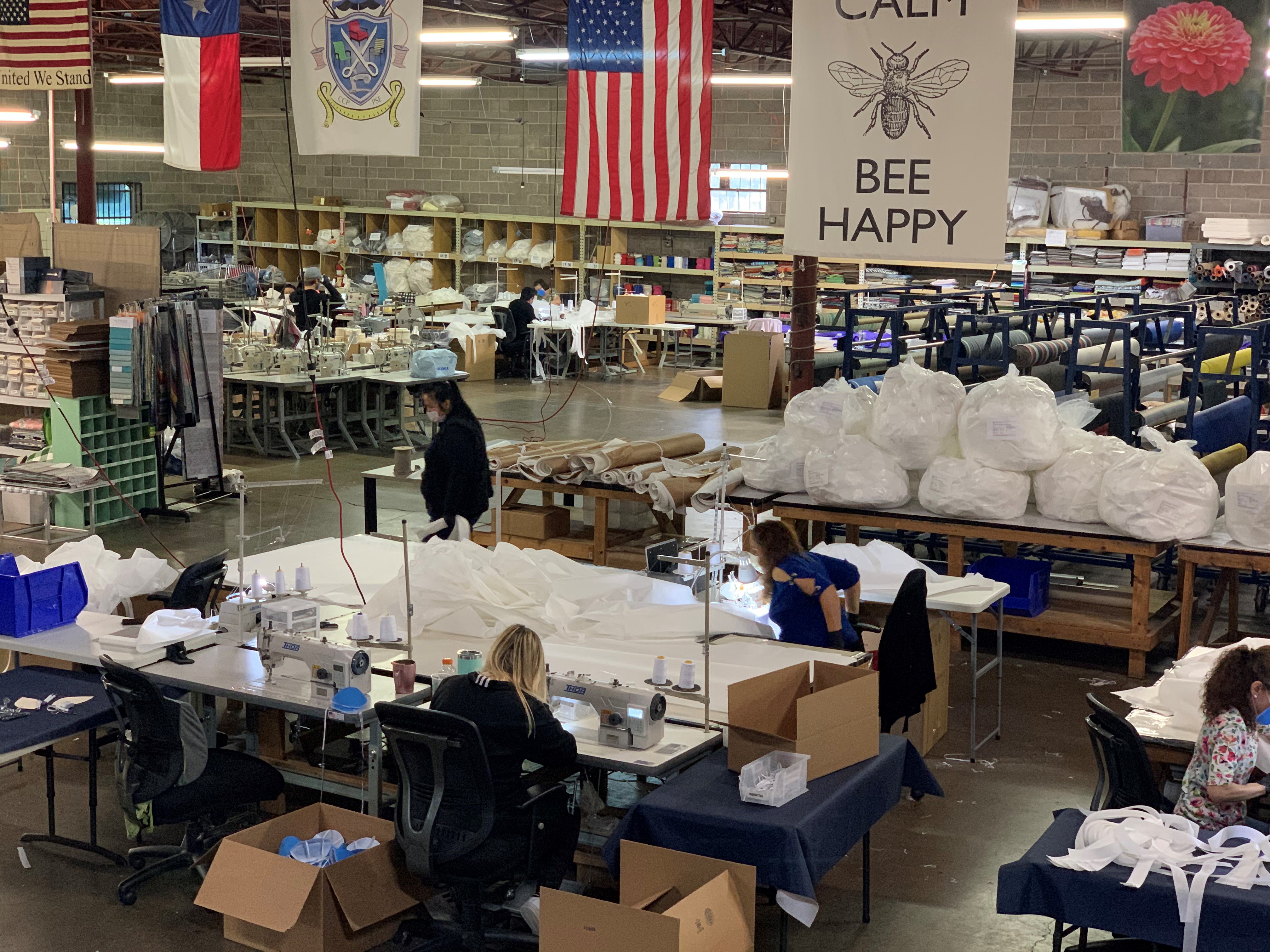
PPE production in Chair Care Patio factory
Today, Martz is working through an order for 20,000 face shields from Baylor, Scott and White Hospital in Dallas, which has a network of 400 hospitals in north Texas.
Chair Care Patio is now turning out 1,500 protective gowns and 1,000 face shields a day to fulfill the order, she said.x
In the past month, Martz purchased 14 new three-needle and four-needle surgers and has also hired 10-12 new sewers to her existing workforce, while carefully considering expanding her business over the long term.
“We have proven we can make things in America with a high quality and at a reasonable price,” Martz said. “I think we need to source material and goods in the United States and bring it all back to the United States to manufacture products like this and not be so dependent on imports from other countries.”
It has been a gratifying experience to help hospitals and keep her current staff employed, while adding new employees to the staff, she said.
“I think we need to get back to that manufacturing base of sewing and manufacturing because we can,” she noted. “We figured it out because we were forced to figure it out.”
Hoover Architectural Products
Hoover Architectural Products, a leading metal and fabric awnings manufacturer founded in 1949, with locations in Palm Beach and Fort Lauderdale, Florida, has made fabric awnings for the past 71 years and recently diversified into metal and other products for its customers.
Before the COVID-19 pandemic, Hoover had 44 employees but like so many other companies, it has had to lay off part of its workforce, said Matt Carroll, a third- generation owner.
The company’s traditional customer base ranges from general contractors to government and defense contractors as well as commercial customers such as The Cheesecake Factory, as well as residential, hotels, restaurants, resorts and shopping plazas.
Carroll said he was watching television with his son and heard about the need for face shields. His son, who told him he could make the face shields, was the initial catalyst behind his move into producing the PPE product.

Face shield production at Hoover Architectural Products
An inventor at heart—Carroll has a patented product set to hit the market later this year known as Wiper Fill, which filters rain water, turns it into wiper fluid or antifreeze, and deposits it into an vehicle’s wiper fluid tanks—he reached out to Kelley at Trivantage and heard about other fabricators who were starting to make face shields.
In just two short days, he had come up with the prototype and design that he is making now—a flexible, face shield with foam cushion that rolls up into a two-inch diameter tube. Putting his inventor instinct to work, Carroll utilized marine and awning grade clear vinyl that is scratch resistant and cleanable, foam cushions and Velcro brand straps.
“I was talking to nurses who said every time they turned their heads, the traditional face shields they use would hit their shoulder and fall off because of the hard plastic rigidity to them,” he said.
Carroll said he has the capacity to make 7,500 to 10,000 face shields a day and has currently made about 2,000 for local contractors and a medical health care facility, as well as orders for single-use by private companies.
He is also bidding on very large contracts of between 300,000 to 800,000 units and working with local hospital systems.
“As far as my philosophy of working through this time, we have given away more shields than we have sold, because there is so much red tape [on securing orders],” he said. “It is more important to me to be a good partner within our community than to make money. I do want to keep my employees busy and make sure they have a paycheck but it is as equally important to take care of our community.”
Carroll said collaboration with other fabricators and Trivantage has been important. The companies have shared designs, raw material suppliers and even cutting templates in the spirit of providing first responders with critical supplies.
The supply chain of fabricators with cut and sew operations in the U.S. is extensive. They can be competitive on pricing and provide much needed supply, he said.
“If anything, this is going to teach us a good lesson to be a little more prepared,” he noted. “Build a stockpile, yes, but also be better prepared; know who the manufacturers are; have them pre-certified and screened and they will be able to flip a switch and go. It is critical for our nation’s security.”
Carroll echoed the sentiment of other American small business owners—that it is critical to maintain and prepare the country’s domestic supply chain for future threats.
“If we can’t take care of our own needs, then we’re not as strong as we could be as a nation,” he said. “Buying U.S. products from manufacturers that are local, sourcing local is important. It doesn’t make sense, in my opinion, for California state to be buying from a company in Florida when there are numerous local manufacturers.”
Rainier Industries Ltd.
Rainier Industries is an historic Seattle, Washington-based tent, awning and graphics company that has been producing products in the Pacific Northwest since 1896.
The company has three divisions—shelter, shade and display, including commercial and residential awnings, tents and industrial sewn products and a graphics print business.
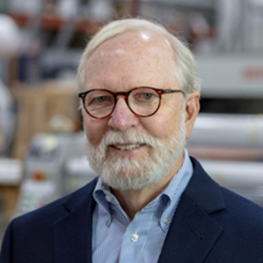
Scott Campbell, president of Rainier Industries
Employing 250 people when operating at full capacity, Rainier has two plants in the Seattle area, as well as an assembly plant in North Carolina.
Scott Campbell, president of Rainier, said his existing tent and shelter business has been in high demand during the crisis, particularly for use as temporary shelters in the emergency hospital space.
Although the demand has also been high for sewn masks, Campbell said he could not take on additional business because his fabrics business is at full capacity due to the demand for emergency tent products.
But he jumped at the opportunity to develop prototypes for face shields and has been part of the shared discussions and collaboration involving fabricators, hospital systems, Glen Raven and Trivantage.
Companies worked on their own proprietary designs for face shields with different cost structures and designs, found ways to collaborate on suppliers and designs and taking the product to market.
“I really appreciate Bret, Trivantage and Glen Raven collaborating with us in taking face shields to market,” he said.
Rainier has sold 20,000 units of the clear vinyl face shields. The company’s largest customer to date has been the Department of General Services, Procurement division for the state of California, and it also selling the face shields to local hospitals.
“The demand is so high for face shields and they are primarily disposable at a low price point,” he said. “We are not making any money but we are keeping our people employed.”
Rainier is also launching a web-based store to sell its face shields but Campbell said he is uncertain whether this will develop into a long-term business for the company.
“We don’t want to get too deep into this and end up with a lot of inventory,” he said, echoing concerns shared by small business owners across the country.
Small business owners are facing serious challenges, including furloughing workers until business picks up, keeping on as many employees as possible, and developing PPE prototypes for products such as face shields, that have never been a part of their business plans.
“In general, there is no clear path in front of us. If business is shut down too long, the economic damage accelerates but if we bring them back too soon, you have health issues to worry about,” he said. “It is really difficult to do business planning and forecasting with a huge variety of unknowns.”
The silver lining, he said, has been developing new products, such as the face shield, which has generated healthy competition among his employees and could still evolve into a new business opportunity.
CCP Manufacturing
CCP Manufacturing is a custom manufacturer of canvas and vinyl products, providing contract sewing services for a variety of industries, including the athletics, medical, industrial, military and transportation areas.
Founded in 1965, the company has grown and diversified and has existing production in the medical field with its healthcare products line, which incorporates high-quality antimicrobial fabrics.
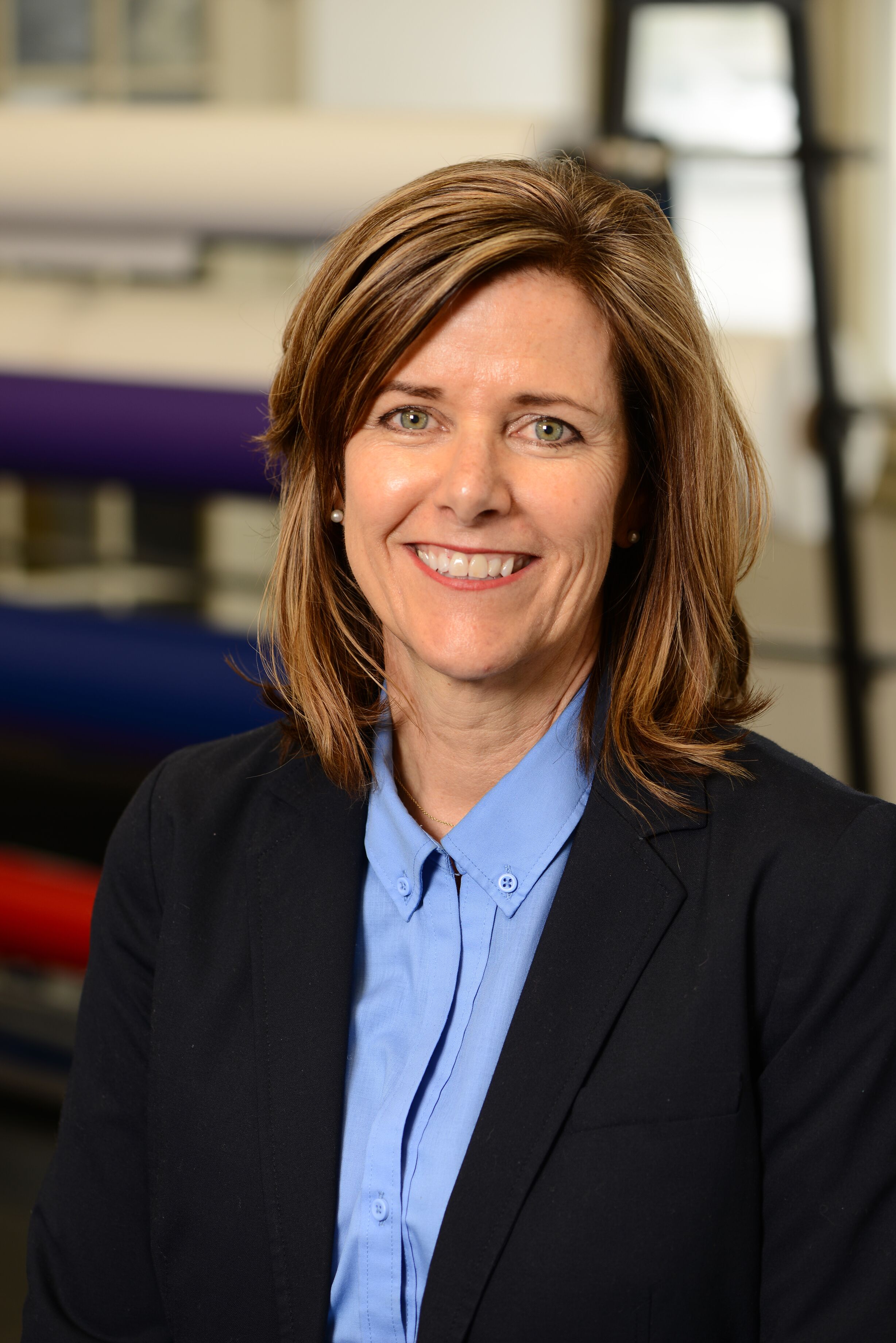
Jan Kellogg, president and owner of CCP Manufacturing
Face shields were not part of the company’s production line until COVID-19 hit but the company has an existing medical production line, said Jan Kellogg, president of CCP and a third-generation owner.
Tapping into her medical products, which includes a line of radiology straps for hospitals, Kellogg said she has used sewing capacity and materials to fabricate the face shields.
“We also took materials that we might use for windows—clear vinyl for curtain walls—and used them for the shield,” she said. “We have elastic that we use for the medical products that we manufacture and we utilized that as well.”
She estimates the company is now producing between 4,000 to 5,000 face shields per week for local hospitals and office groups in Ohio.
“We are doing this for two reasons: 1. To help people who need them and 2. To give our employees continued employment and a meaningful task at the same time,” she said.
Kellogg said it is easier to get the face shields into the hands of people locally, who are quick to make a decision to purchase.
Her response to healthcare groups and hospital associations who are looking for much larger quantities, is to let them know she is capable of supplying a portion of an order and works to see how her company can be part of the solution.
“We are very happy to be part of that whole process,” she said. “It revolves around innovation and openness to how to come to a solution for this new and different problem that we have never faced before.”
Kellogg has weathered economic downturns in the past, particularly the housing crisis of 2008 and 2009 that led to the Great Recession.
Her philosophy: “You come up with ideas like we did today and you move forward—and take care of your people.”
J Miller Canvas LLC
For the past 25 years, J Miller Canvas LLC/Inc. in Santa Ana, California has manufactured architectural fabric structures, including tension umbrellas and retractable restaurant canopies; but the swift impact of the COVID-19 pandemic on the U.S. economy has turned the company into manufacturers of PPE face shields overnight.
Dan Neill, principal of J Miller Canvas, said he bought the company with his business partner nearly two years ago. The company works with developers and architects and manufactures architectural fabric structures for a variety of commercial market segments.
Neill recently learned that Providence St. Joseph Health (a group operating six to seven hospitals), was utilizing hospital volunteers to manufacture the shields and felt with the help of J Miller Canvas manufacturing the shields, the hospital volunteers could utilize their services in other areas.
“We went into the back and told our guys we needed to make shields. We put a couple of examples up on the screen, Googled face shields and let them go to town,” Neill said.
His team ran through 30 different design ideas and overcame various material supply challenges. But once they finally landed on the right design, production of the first face shields could begin.
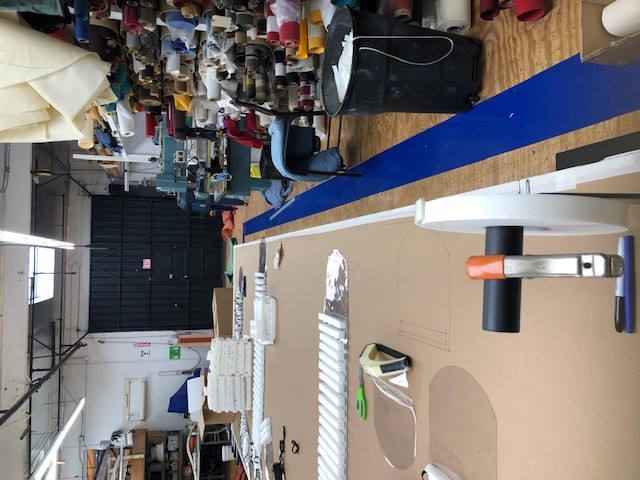
Face shield assembly station at J Miller Canvas LLC
After delivering its first prototype, J Miller Canvas received an order for 10,000 units from St. Joseph’s and was manufacturing 500 to 750 face shields per day. Production has been put on hold currently, as the initial supply demand was met earlier than expected; but is expected to start up again very soon.
The face shields, comprised of a 20-gauge clear vinyl material with a one-inch square foam for the forehead and elastic band that holds the shield to the face, are primarily used for drive-up testing sites and other non-surgical activities in hospitals.
“Bret Kelley at Trivantage has been ‘essential’ in facilitating connections between our industry and hospital groups”, he added. “He has been a huge leader, telling hospitals ‘we have guys out here who can help and here is their name and number.’”
“We’ve never seen anything quite like this,” Neill said of the COVID-19 pandemic. “This is going to be something for the history books. We will be talking about April 2020—the year the world shut down.”
But it will also be considered the year U.S. small businesses turned their know-how, creativity and innovation into action and retooled production lines or used existing materials to rush to the aid of the nation and frontline health care workers in need of critical PPE products.
“Our workers have taken ownership of the face shields,” he said (noting the company employs 22 people). “Our whole goal is to keep these guys employed. They are the lifeline.”

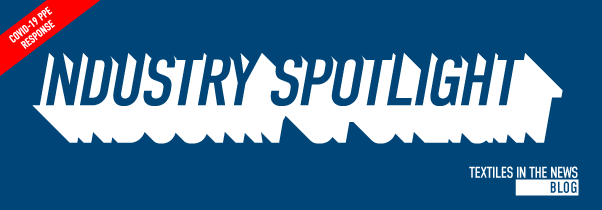
 The 140-year-old performance fabric manufacturer with six manufacturing facilities in North Carolina, South Carolina and Pennsylvania, along with 12 distribution facilities in 11 states, has stepped into the PPE game and is having a major impact.
The 140-year-old performance fabric manufacturer with six manufacturing facilities in North Carolina, South Carolina and Pennsylvania, along with 12 distribution facilities in 11 states, has stepped into the PPE game and is having a major impact.



